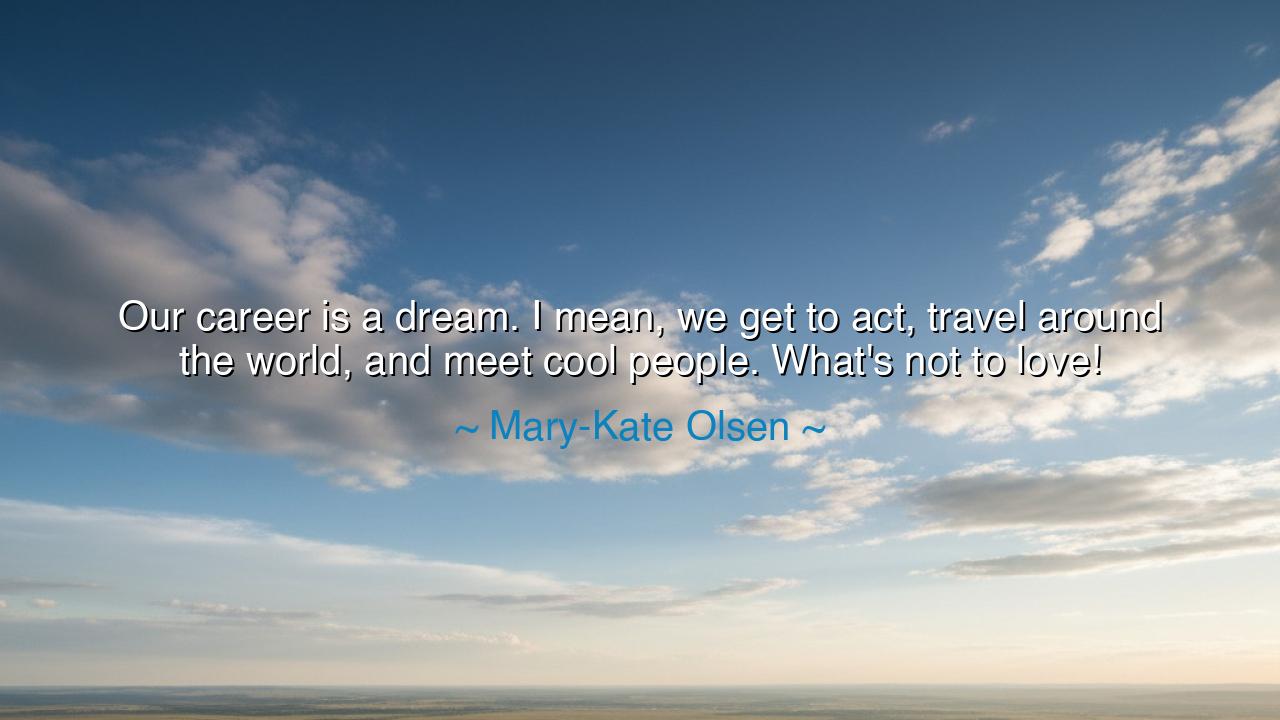
Our career is a dream. I mean, we get to act, travel around the
Our career is a dream. I mean, we get to act, travel around the world, and meet cool people. What's not to love!






"Our career is a dream. I mean, we get to act, travel around the world, and meet cool people. What's not to love!" These words from Mary-Kate Olsen reflect the joy and gratitude that can come from finding a career that not only aligns with one’s passion but also offers adventure and excitement. Olsen’s career, particularly in the world of acting and entertainment, allows her to live out a dream that many long for: the ability to create, to explore, and to meet extraordinary people along the way. Her words suggest that when we are fortunate enough to pursue something that stirs our soul and offers us joy, it ceases to be merely work—it becomes an embodiment of our dreams, a life lived in alignment with our deepest desires.
In the ancient world, the idea of a dream career or destiny was tied to the notion of purpose and fulfillment. The Greeks believed that each person had a unique calling, something they were destined to do in order to live a life of meaning. The philosopher Aristotle spoke of the concept of eudaimonia, often translated as human flourishing, which suggested that true happiness and fulfillment come from living a life in accordance with one’s nature and talents. For the ancient Greeks, a fulfilling life was one where the individual’s work and passion aligned, and through this, they could find true contentment. Olsen’s words resonate with this ancient ideal: when our work becomes a form of self-expression and joy, it transcends the mundane and becomes part of our larger journey toward fulfillment.
In a similar vein, the Romans admired the concept of virtus—the quality of excellence and living with purpose. Cicero, one of Rome’s greatest philosophers, believed that duty and virtue were key components of a meaningful life. Yet, Cicero also understood that a life of excellence was not defined by stoic endurance alone but by passion and delight in the pursuit of one's calling. When Cicero spoke of virtuous living, he didn’t just mean living with strength or moral integrity—he meant living with joy and purpose in one's work, whatever that work might be. This speaks to Olsen’s reflection on her career: when we are able to align what we love with what we do, it becomes a source of joy and meaning.
Consider the story of Leonardo da Vinci, one of the most renowned polymaths in history. Da Vinci did not simply view his career as a job, but as a pursuit of all that fascinated him—art, science, anatomy, engineering, and more. His life was one of constant exploration and discovery, where his passions were interwoven into his work. Da Vinci found fulfillment not just in completing tasks but in the joy of creation and the constant pursuit of knowledge. His work, like Olsen’s dream career, was an opportunity to travel through the world of ideas, meeting fascinating individuals along the way and pushing the boundaries of what was known. Da Vinci's life exemplifies the notion that when our work is a dream, we flourish not only in our personal growth but also in our contributions to the world.
The ancient Stoic philosophers, such as Epictetus and Marcus Aurelius, also spoke of the importance of purposeful work, but their approach emphasized virtue in all things, even in the face of hardship. They believed that work should be approached with a sense of duty and commitment, even when external circumstances are not ideal. Yet, even the Stoics acknowledged the value of doing work that aligns with one’s nature and passions. Epictetus wrote, “It’s not what happens to you, but how you react to it that matters.” The joy in Olsen’s words speaks to a deeper truth: when we engage in work that brings us meaning, we are more likely to approach life with a sense of fulfillment and gratitude, despite the inevitable struggles.
The lesson to take from Olsen’s reflection is one of alignment and joy. When we find work that resonates with our soul, something that brings purpose, creativity, and delight, we are no longer bound by the conventional idea of work. Instead, our career becomes a form of self-expression and exploration, much like Olsen describes—an adventure in which we are free to experience the world and connect with others. This alignment of passion and action not only leads to success but to a richer, more meaningful life.
In practical terms, the advice here is simple: find your passion, and align your work with it. Whether through art, science, business, or any other pursuit, when we dedicate ourselves to something that excites and fulfills us, our work becomes a dream, a joy, and a lifelong adventure. Just as Olsen sees acting as a dream, we too can turn our own pursuits into something that not only fulfills our personal desires but contributes to the greater good. By living with this spirit of exploration and enthusiasm, we can make our careers—and our lives—an embodiment of our deepest passions.






AAdministratorAdministrator
Welcome, honored guests. Please leave a comment, we will respond soon